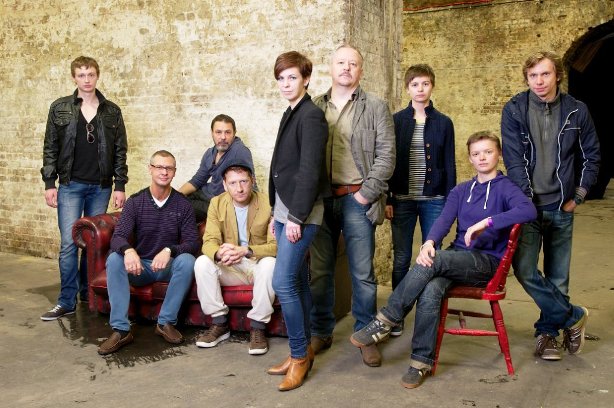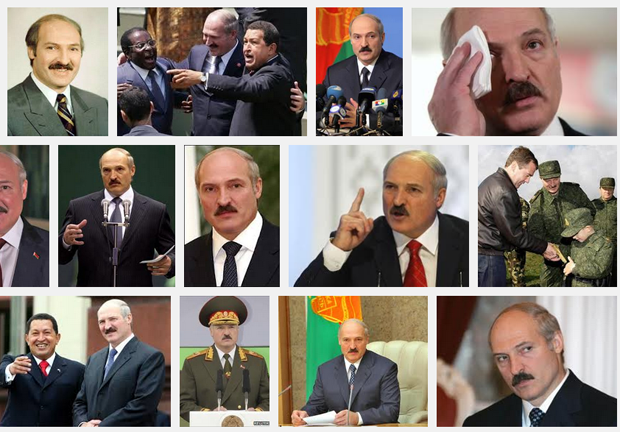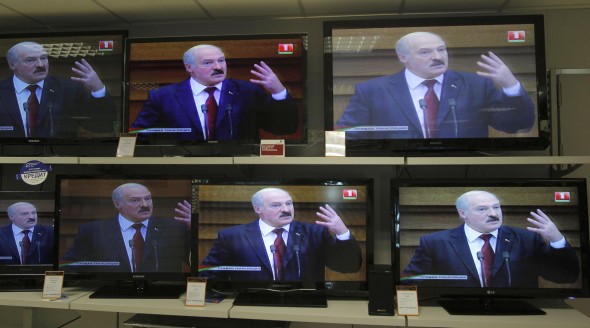31 Oct 2013 | Belarus, News and features, Religion and Culture

Members of the Belarus Free Theatre in fall 2012
Keeping tight control over every sphere of social life is the general policy of the Belarusian authorities. This is true not only about politics, economy or media; arts and culture face censorship as well.
Music: to “black lists” and back
Rock music has always had social protest at its core. Belarusian state ideologists still keep this idea in mind. Lyrics written in the Belarusian language and popularity among opposition supporters are two features that can ensure a rock band gets in trouble.
The authorities of Belarus are not really inventive and sophisticated in the ways to silence the musicians they consider “harmful”. Unofficial “black lists” of rock bands and singers were introduced; they have not been openly public, but managers of radio stations or concert organisers and promoters are aware of them. No tracks of a “forbidden group” are broadcasted by FM-stations; no club organises a gig of a blacklisted artist, even if they know it will definitely be sold out.
During a press conference in January 2013 President Alexander Lukashenko publically asked the Head of his administration to provide him with this “black list” – suggesting there is not one.
“Believe me, I have never made any orders or requests to create any ‘black lists’ to restrict anyone from singing or dancing here. If someone pays such artists for them to heap dirt upon our country, I wish they sing to those who order such music. But I don’t know about any of these facts,” the country’s ruler told a journalist who asked the question.
“His will to get rid of ‘black lists’ might be genuine. We all got to the point when everybody wants to get rid of these black lists: musicians, audience, officials, even the president himself. But it is not easy to do, because the system is in place, and it is the system of fear that works autonomously; it is installed in the society so strongly that even Lukashenko himself barely controls it,” says Aleh Khamenka, a frontman of a famous Belarusian folk-rock band “Palac”.
He admits the situation changed a bit after the press conference in January. For instance, “Palac” was previously black-listed and had to perform under different names (e.g. “Khamenka and friends”) to be allowed on stage in Belarus; now they can openly organise concerts as “Palac” again.
But the “thaw” for rock musicians in Belarus has not been long. A new Presidential Decree, signed in June 2013, suggested an organiser of any concert must receive a special permission in a local Department of Ideology.
“De-facto, in many regions of the country such permissions were to be obtained even before the decree was signed. Now this method of censorship became law,” says Vital Supranovich, a musical producer.
Cinema “spoilt by censorship”
Production of most films in Belarus is funded by the state. But the question is whether anyone sees them.
“Quite a lot of movies are produced, but have you seen any of them? I doubt it. These movies are dull and not interesting for the audience, they are spoilt by existence of censorship. And state ideologists attempt to censor even films they do not fund, by putting pressure on production companies and trying to influence the content,” says Yury Khashchavatski, a Belarusian director, well-known for his documentaries about President Lukashenko and repressions against political opposition in Belarus.
Direct censorship is ensured by “professional propagandists”, who are appointed to manage cultural institutions. For instance, Uladzimir Zamiatalin, who used to be a chief ideologist of the Presidential Administration, was the CEO of Belarusfilm, the state cinema company of Belarus, for quite a long time.
“If you want to make a movie here, film something with a title like ‘Belarus is a country of true democracy’; thus you will be sure you are allowed to produce it without much interference,” says Khashchavatski.
Censorship goes far beyond production. Belarus has a special list of movies that are banned from distribution in the country. It used to be public, and was posted on the official website of the Ministry of Culture, but was deleted from there afterwards – “not to advertise those movies.” At the time it was public, the list included, for instance, Antichrist by Lars von Trier (that won a prize of the Cannes Film Festival) or movies by Tinto Brass.
Theatre: Online performances vs. censorship
Belarus Free Theatre is another example of how artistic freedom is restricted by the authorities of the country. Police officers are people who never miss its performances in Belarus: not because they are ardent theatre goers, but because they stop actors from performing.
“Every time the Free Theatre stages a play in Belarus, there come the police that stop the play. But this is just a visible part of restrictions; real repressions take place outside the stage. All our actors are fired from state theatres, expelled from universities; almost all of them were detained or arrested. We feel this pressure all the time,” says Nikolay Khalezin, the art director of Belarus Free Theatre.
He believes, the theatre is dangerous for the authorities, because it is independent and pays no attention to state censorship and demands from official propagandists. The price the BFT pays for this artistic freedom is harsh: the audience of their plays in Belarus is very limited; they can only stage small performances in tiny semi-clandestine premises they can find. Two of their new plays, Trash Cuisine and King Lear, that gathered huge audiences abroad, are impossible to stage in Belarus – not only because no theatre allows them in, but also because two of the actors were deported from the country in 2008 and are not allowed in.
“We have found new opportunities to present our work to Belarusian public. During Edinburgh Festival we organised live online broadcast of Trash Cuisine; it was on 22 August and it was Sunday, thus many Belarusians were able to watch our play from home,” says Nikolay Khalezin.
The idea worked. The first broadcast received 6,000 views, 85% of which were from Belarus. State censors in Belarus could do nothing about it.
According to Yury Khashchavatski, art helps to inform and educate people; it promotes real human values, rights and freedom – and this is exactly what irritates the authorities. They prefer ignorant citizens that are easier to rule, and they use censorship to prevent people from thinking and questioning the reality presented by official propaganda.
“Why are the authorities so afraid of independent artists? The answer is quite simple: Art is dangerous for the authoritarian regime, because it turns obedient population into real citizens,” says Khashchavatski.
This article was originally published on 31 Oct 2013 at indexoncensorship.org
16 Oct 2013 | Belarus, European Union, News and features

An old Belarusian joke suggests a simple way of improving one’s life. If you feel unhappy, just allow a goat in your house, live with it for some time, and then take the goat away. In principle, nothing changes – but you feel real relief and happiness! This is exactly the way the foreign policy of Belarus operates.
Close the Swedish embassy in Minsk, and then allow its re-opening. Arrest Vladislav Baumgertner, the CEO of the Russian potash giant Uralkaliy, and then set him free. In principle nothing changed, but each story ended with something like “an improvement in the situation” – or at least with an impression of such.
Last year EU-Belarus relations, already on the rocks, were further damaged by the infamous teddy-bear parachuting and subsequent diplomatic scandal with Sweden. In comparison with that period of “cold war” 2013 looks relatively moderate. For instance, the Belarusian foreign minister Uladzimir Makey was temporarily dropped from the EU travel ban list. Nonetheless, the overall temperature of relations is frosty.
Political prisoners remain jail in Belarus. The fact two of them were released recently had nothing to do with the authorities’ good will; it happened just because their prison terms expired. The decision to suspend the travel ban for Makey was also purely technical. The position of Foreign Minister from the very beginning wasn’t on the EU travel ban list in order to leave a channel for direct communication with Belarusian authorities. Makey, personally, is still on the black list and will not be allowed to enter the EU if he leaves his minister position.
NGOs and opposition excluded from talks?
Since the beginning of 2013 the number of contacts between the EU and the Belarusian Foreign Ministry has increased. EU diplomats call this process “consultations with the Belarusian government”. But it’s hard to say exactly what the content of these consultations is. It is known that the Belarusian side propose to re-organise the European Dialogue on Modernisation. This EU initiative would establish intergovernmental relations between the European Commission and the Belarusian authorities, including an annual meeting of presidents Lukashenka and Barroso. But they have also suggested excluding representatives of civil society and political opposition from the Dialogue.
According to Belarusian authorities’ rhetoric, any relations with the EU within the framework of the Dialogue on Modernisation or the Eastern Partnership should be built “on equal basis and should focus on mutually beneficial projects.” In translation from diplomatic to real language this is nothing but a request to lift all the conditions related to democracy, rule of law and human rights, and simply invest in Belarus’ economic and infrastructure development.
It comes as no surprise that the EU is not ready to fully support these proposals right now. That they’re ready to talk about it, however, does. The next phase of the European Dialogue on Modernisation is going to be limited to experts with a focus on the themes that only the Belarusian government is interested in. In fact, civil society has not been granted the status of full participants in the Dialogue – despite numerous statements and appeals about the vital necessity of this.
Opposition fractured, weakened and ineffectual
In 2014, the European Commission and the European External Action Service (EEAS) will change their staff, so they should be interested in showing some progress with regards to Belarus. In the absence of real progress, renewal of official contacts with the Belarusian authorities could be presented as an achievement.
It is not worth blaming the EU for such behaviour, though, all the while Belarusians themselves have not done much to change the situation. Neither autocrats or democrats have undertaken significant steps to resolve the current deadlock. The latter manage to disunite – without ever forming a real unity in the first place. Political opposition was formally divided into two parts; the “People’s Referendum” campaign and the “For free and fair elections” coalition. Real differences between the two are hard to explain. Both of them pray to the old God of “communication with ordinary people”. This is a noble task in any sense, but actions proposed are not significantly different from previous unsuccessful attempts to respond to the people’s needs. The oppositions’ slogans are not easy to understand even for their closest civil society allies. Sometimes it feels like these activities are implemented just for the sake of keeping political activists busy, gaining some media attention and getting some resources from donors in the process.
The main aim for the opposition forces is to remain on the political scene until the next presidential elections. Independent civil society organisations are also divided in different camps and have lost their positive dynamics of previous years; still they have much more potential than the weakened political opposition. As a result of disunity among democrats they cannot respond properly to the EU proposals or the challenges of the internal political situation. The EU is listening to the contradictory voices of various Belarusian activists without the possibility to coordinate with them on the main course of action.
Challenges in encouraging change
Thus, the EU policy faces a clear choice: either to wait for internal changes in Belarus or try to actively facilitate them. The recommendations of the European Parliament on the EU policy towards Belarus (the so-called Paleckis’ report), adopted on 12 September 2013, make step in the latter direction. The central idea of strengthening pro-European attitudes among different groups of actors from the civil society to open-minded civil servants via closer engagement in cooperation with the EU looks good. Civil society is seen as one of the key actors in political dialogue with the EU. It is also mentioned that “the National Platform of the Civil Society Forum of the Eastern Partnership is an important and reliable partner and a unique communication channel to the Belarusian people for the EU”. Actions aiming at communicating European policies to the Belarusian citizens, expanding education programs, development of scientific cooperation are also recommended.
The European Parliament doesn’t propose significant changes in the current EU policy, but the EU needs to go much deeper into the Belarusian political situation to insure even these slight changes. The new way lies between facilitation of public dialogue between the Belarusian authorities and civil society on the one hand, and playing the engagement game with nomenklatura on the other hand.
This is not an easy task, it needs a lot of reflectivity, good understanding of the field, strong diplomacy and coordination between various actors’ – civil society organizations, political opposition forces, donor structures, EU member states, and international organizations like Council of Europe, OSCE, UN.
While playing this complicated game in some cases the EU will have to back one internal actor and its strategies against others. And this is what the EU is not ready to do. The overall approach demands to support all the actors who proclaim pro-democratic and pro-EU values. As a result the EU policy creates a plurality and centrifugal trends within the civil society and political opposition that is the main obstacle for consolidation among democrats. Attempts of strategic unification immediately run into charges of “monopolization” and “privatization” of civil society voice. The EU needs a strong internal counterpart in Belarus, which never appears without civil society consolidation, but it is not ready to let this consolidation happen. This vicious circle must be broken to proceed with the Belarus situation.
Of course, there is another way: impose travel ban on Minister Makey, then lift it – and, according to the famous “goat principle”, feel relief…
This article was originally published on 16 Oct 2013 at indexoncensorship.org
2 Sep 2013 | Belarus, News and features
 For the first time since the 2010 presidential election Belarusian independent journalists can catch their breath. In March the criminal case against Andrzej Poczobut, a journalist accused of libel against the president, was dropped. ARCHE magazine, which was close to being shut down was finally re-registered by the Ministry of Information in May. OSCE Representative for Freedom of the Media Dunja Mijatovic was allowed to enter the country in June, and authorities even met with her. Following her visit charges against Anton Suriapin for posting pictures of the famous Teddy Bear pictures, were dropped. Award-winning journalist Iryna Khalip has reached the end of her two-year sentence.
For the first time since the 2010 presidential election Belarusian independent journalists can catch their breath. In March the criminal case against Andrzej Poczobut, a journalist accused of libel against the president, was dropped. ARCHE magazine, which was close to being shut down was finally re-registered by the Ministry of Information in May. OSCE Representative for Freedom of the Media Dunja Mijatovic was allowed to enter the country in June, and authorities even met with her. Following her visit charges against Anton Suriapin for posting pictures of the famous Teddy Bear pictures, were dropped. Award-winning journalist Iryna Khalip has reached the end of her two-year sentence.
On the other hand, we should not be deceived by these positive developments. Negotiations with Mijatović did not prevent Belarusian authorities from seizing a whole print run of Nash Dom newspaper, accusing journalist Alena Sciapanava of cooperation with foreign media without a relevant accreditation, or detaining a number of reporters covering a street action by opposition activist in July.
So, is there a thaw for Belarusian media? Can further changes be expected?
One step forward after two steps back
Belarus is ranked 157th in Reporters Without Borders’ 2013 World Press Freedom Index, rising 11 places compared with their 2011/2012 rating. But this only means the country has restored the situation to where it had been before the severe clampdown on free media and civil society in December 2010. Independent journalists and online activists still run risks.
“The authorities have made a small step forward after they made two huge leaps back. The situation improved a little if we compare it with the one we had after the 2010 presidential election. But on a systemic level neither media-related legislation, nor its implementation have changed,” says Andrei Bastunets, a media lawyer and a vice chairman of the Belarusian Association of Journalists (BAJ).
The positive developments are welcome – but history suggests they are not irreversible. In 2008-2009 similar period of “liberalisation” was marked with two big conferences in Minsk co-organised by the Belarusian authorities with the office of OSCE Representative for Freedom of the Media. There, the decision was made to return two national independent newspapers, Narodnaya Volia and Nasha Niva, to the wide reaching state run systems of press distribution. But the ‘good times’ turned into a renewed period of repression after 2010.
Sviatlana Kalinkina, chief editor of Narodnaya Volia, says life is easier for the publication now than it was five years ago when it had to be printed in Russia and was not allowed to be sold at newsstands or via subscription catalogues in Belarus.
“The approach of the authorities is to make the situation worse, then to return it to where it was and thus claim there have been improvements and ‘democratisation’. But in fact even after we were allowed to be printed and distributed in Belarus we were not able to come back to where we used to be. Narodnaya Volia used to be a daily, now we publish our newspaper twice a week and cannot get a permission to be printed even three times a week. Printing houses and distribution networks keep telling us it is impossible, although it is obvious these are just lame excuses. These problems are clearly orchestrated by the authorities,” says Sviatlana Kalinkina.
It is difficult for a journalist of an independent newspaper to receive a comment from state officials; they are afraid to talk to non-state press.
According to Yanina Melnikava, the editor of the online publication Mediakritika.by, the situation inevitably affects the quality of work of Belarusian journalists.
“One the one hand it makes a journalist’s work really hard. But working in the conditions of an ‘information war’ leads to a ‘barricade mind-set’ that can be used to justify mistakes and lack of professionalism,” says the editor.
Screws to be tighten again before elections
Sviatlana Kalinkina of Narodnaya Volia does not think conditions for her newspaper will significantly improve in the nearest future, because the next presidential election is scheduled for 2015.
“Political campaigns are not the best time for journalists in Belarus. People are getting more interested in independent news which makes authorities start to panic, resulting in more oppression,” Sviatlana Kalinkina says.
So why would the government allow some minor improvements of the situation? The answer is simple – just to have some “room for manoeuvre” when the screws are to be tightened again.
“The closer elections are, the more we are likely to feel freedom and democratic change is possible. But this is just an illusion. The reality is different. The authorities see election campaigns as a threat to their power and they are ready to protect their power whatever it takes,” says Yanina Melnikava.
Not ready for the first step
During her press conference in Minsk on 5 June, Dunja Mijatović said time had come for serious change in the freedom of expression situation in Belarus. She called on journalists to “work with the authorities and bother them in order to let the government of the country know about the importance of laws for development, not for oppression of the media.”
“But the real change requires a totally different relationship between the authorities and the media. Such change of an attitude should take place on an ideological level, as well as on economic and legal levels”, Yanina Melnikava admits, adding that she sees no signs of such changes at the moment.
Andre Bastunets suggests there should be a road map the authorities can keep to in order to liberalise the media field. The first step would be ceasing of economic discrimination of independent media: all non-state newspapers should be allowed back on to state-run distribution systems, restrictions of circulations and advertising in them should be lifted.
“About half of independent newspapers face problems like these now. And there is no need to change the law to solve the problem – on the contrary, we just need to implement the law,” says BAJ vice chairman.
The second step would be to ensure access to information for all journalists. The restriction to work without a special accreditation for reporters of foreign media should be lifted. The third one is to stop differentiating between state and non-state media at all.
“I am sure there should be no state-owned media in a democratic country except for bulletins with legal acts adopted by state bodies. All media should be private or public,” says Andrei Bastunets.
However, the authorities of the country show no signs they are ready event to make that first step, which means the current not-so-bad situation is always under threat of a set-back.
14 Aug 2013 | Belarus, Digital Freedom

Andrei Karelin
A theatre playwright and a former worker from the Minsk Automobile Plant were found guilty of using offensive language online in Belarus.
Andrei Karelin, a playwright, was sentenced to an administrative fine of 10 million Belarusian roubles (about £725) for two comments he had made on a forum of a popular Belarusian internet portal TUT.by. The comments reflected his negative attitude toward Belarusian police.
According to Karelin, he had to call the police when he was attacked and beaten in Minsk on 18 May this year, but said he did not receive proper assistance, and was offended by officers instead. Among other words he chose to describe the officers on the forum were “bastards” and “boors”. He also said they were “fat and imposing” and concluded that “all normal citizens hate” the police.
A district court in Minsk had two hearings on the case (on 11 July and 26 July) and sentenced Karelin to fines for “insulting an officer on duty”, despite the fact the allegedly insulted officers admitted at court they had not seen his online comments themselves.
The playwright denies his guilt saying he did not insult anyone, but merely expressed his indignation at lack of professionalism of Belarusian police officers. He started a website to crowd-fund the fines he calls “enormous” as they are equal to 3 months of his salary.
Another Belarusian, Ruslan Mirzoev, got 7 days of administrative arrest for videos he posted. He became popular last year after he started posting online videos about daily life of workers of Minsk Automobile Plant (MAZ), one of the biggest enterprises in Belarus. Mirzoev was finally fired from the plant in July 2013, but he continued production of his videos.
Ruslan started his own video project, Chronicles of a District («Хроники района»), on YouTube, and made two videos about drug addicts, a prostitute and alcoholics, who live in Kurasoushchyna, the district of Minsk where he lives. On 9 August he was detained and sentenced to seven days of administrative arrest for using obscene words in those videos.
This article was originally published on 14 Aug 2013 at indexoncensorship.org. Index on Censorship: The voice of free expression.




